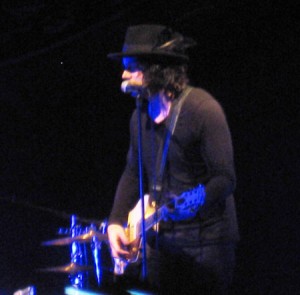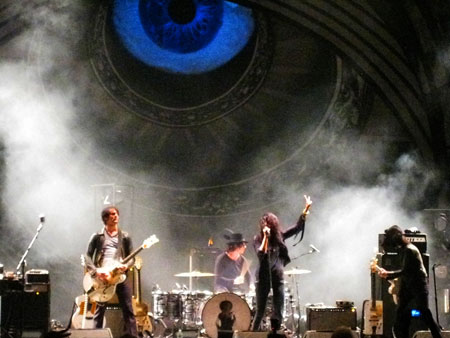(8/3) Too often these days when you go see a band play live, what you wind up getting is pretty much a note for note rendering of the band’s recorded material. In and of itself there’s nothing necessarily wrong with this, but sometimes I feel like I might as well be seeing the band members doing nothing more than striking rockstar poses and miming along as their cds play in the background. Hey Weezer, I’m looking at you. So it’s rather refreshing when you get to see a band lay caution aside and tap into that almost dangerous level of excitement that tends to characterize the best live rock performances. I’m not even talking about hackneyed theatrics that have been a staple of rock performances since before Elvis Presley’s hips were censored on the Ed Sullivan Show (After all, we mustn’t allow our virginal teenage daughters to see such obscenity! Heaven forbid!), but a danger that comes from a band letting it all hang out musically and teetering on the edge of collapse. The whole affair is permeated with a sense of foreboding that at any minute the whole thing could fall apart into a shit show of epic proportions. Rarely does it do so, however, and that’s where the magic of a live performance lies.
The secret behind this magic is a band’s ability to play tight but loose. I guess the phrase is something of a cliché these days, but the ability to perform “tight but loose” was used to great effect by some the best live rock and roll bands ever. We’re talking about names like the Beatles, the Stones, Hendrix, and Zeppelin in their respective primes. The lockstep sense of time that you get from a lot of, but by no means all, modern music, some of which relies on sequencers and drum machines, doesn’t exactly lend itself to being performed “tight but loose” in a live context (although, admittedly, Nine Inch Nails might beg to differ). A large part of the tight but loose magic comes down to a band’s groove, that hard to define quality that exists largely in the spaces between the notes that are actually played. Without getting all hippy-dippy about this stuff, there’s an organic quality to how the music breathes, almost a human element, as it were, in a good tight but loose performance. I don’t think I can express it any better than how a famous jazz drummer discussing different kinds of grooves and timing in music summed it up when he said, and I paraphrase, the groove of much of today’s music is very vertical in its nature, think of the relentlessness of a four on the floor beat that you hear in a lot of indie pop music, whereas a tight but loose groove has a more horizontal feel in that it exists in the spaces and the subtle time variations between the vertical downbeats. I think I need to go clutch my crystal and meditate on that for a bit. BRB. Oh, while you’re waiting, go watch the trololo guy on youtube or something:
Ok. I’m back. Now I’m too young to have seen the aforementioned musicians (well, except for the walking undead who parade around calling themselves the Rolling Stones these days… and I ain’t paying $200 to see them anytime soon… hey editor, next time the Stones come around can you score me up some free passes? I’ll write a review…. and I promise to get it in by the deadline! No, seriously. What? Don’t look at me like that…), but I have access to youtube and thanks to the people who post clips of performances by these bands in the days of yore, I get to experience at least an inkling of what it would have been like to see these monsters of rock in all their alchemical glory skirting the edge of disaster at every turn. As far as shows I’ve actually been to, what sticks out in my mind as one of the best tight but loose performances I’ve witnessed in person still has to be the Raconteurs on their three night stand at New York’s Terminal 5 in 2008. They were epic. There’s really no other word for it. And if you’re reading this I’m sure you’re well aware of the musical DNA shared by the Raconteurs and the Dead Weather. This is supposed to be a Dead Weather review, right? Yeah, yeah… I’ll get on with it.
The Dead Weather hit the stage, decorated with stuffed animal heads beneath an all-seeing eye, at the Prospect Park Band Shell just after sunset decked out in their trademark all black attire and strapped on their all white instruments, with band svengali Jack White brandishing a blowtorch (a blowtorch?! WTF?), and over the next hour and a half the band proceeded to set the place ablaze with their distinct mixture of blues rock riffing, caterwauling vocals and industrial grade distortion. Theirs is most certainly a righteous noise and quite a distinctive one at that. One of the secret weapons of the Dead Weather is the groove that the two Jacks, bass player Jack Lawrence and Jack White moonlighting on the drums, lay down. They hit the one so hard that at times it seems they’re channeling the JBs or even P-Funk. Audiences first got a taste for Jack White’s drumming on his collaboration with Alicia Keys on the theme song for the James Bond movie Quantum of Solace, “Die Another Day,” and I think it was readily apparent that Meg White was merely the second best drummer in the White Stripes (sorry, Meg, still love you). There’s a funkiness and a looseness to (Jack) White’s drumming that evokes much of the same feelings of reckless abandon as his guitar playing. Lawrence, on the other hand is about as solid as they come on his Gretsch White Falcon bass (paired off with guitarist Dean Fertita’s White Falcon guitar, the two make for an attractive couple) in holding the bottom and in deftly negotiating fleet-fingered riffs reminiscent of greats like Zep’s John Paul Jones and the Who’s John Entwistle. He is an ox-like thunderfingers for the 21st century.
 Not to harp on this point, but it is just this funkiness of the Dead Weather’s rhythm section, the infectious groove that they lay down, that in one measure serves to separate them from the pack of indie rock bands today. It’s all a matter of soul, another one of those impossible to define concepts that, much like obscenity, you can only know it when you hear it. Soulfulness is a quality, however, that runs in abundance in projects in which Jack White is involved. Say what you’d like about the White Stripes, but all their recordings, even the more muscular tracks, are brimming with soul and naked vulnerability, while the Raconteurs’ Consolers of the Lonely is far and away the most soulful record to be released in the decade of the naughties. The soulfulness that characterizes Jack White’s work is really an extension of that soulfulness that’s found in the music of the first few crops of 60s and early 70s rock bands. Again, I have to mention the mighty Zeppelin here. I’ll duck while you throw the rotten fruit. But bands like Zep mined African-American music, we’re talkin’ ‘bout the blooz here, for inspiration, and a large part of the soul that’s inherent in the blues transferred over to their music. Later bands who were inspired by Zep and their contemporaries were one step farther removed from the source material, and I think you can tell. The soul of blues music meanwhile continued to percolate among traditionally African-American genres that descended from it like the r&b of Motown and Stax (and I think one thing to keep in mind here is that what was going on at Motown and what bands like the Beatles were doing at the same time are much more closely related musically than is usually acknowledged), 70s funk and eventually hip-hop. Meanwhile rock suffered through a period dominated by the Eagles and other middling soulless acts. Then the punk revolution came and infused a much needed sense of life back into a senescent genre. But the life that the punk movement breathed back into rock was of a different nature than what had originally inspired the music. There was less of the earthy soulfulness of the blues and more of an anarchic rage. Then the new wave/no wave movement replaced the rage of punk with a cool, almost mechanical, detachment. To my ears, a lot of indie rock, and pop music in general, today owes more to a combination of punk rage and new wave detachment than it does to bluesy soulfulness. Which is why the music produced by Jack White, under whatever name and with whatever group he might be performing at any given moment, sounds so refreshing. To get off White’s jock for a second and to be fair, White does not even come close to reinventing the wheel. He’s really doing nothing new. What he does succeed in doing, however, is to recontextualize and reinterpret traditional sounds and genres and to serve them up to a (post)modern audience which has grown unaccustomed to hearing them. And it fucking works like gangbusters.
Not to harp on this point, but it is just this funkiness of the Dead Weather’s rhythm section, the infectious groove that they lay down, that in one measure serves to separate them from the pack of indie rock bands today. It’s all a matter of soul, another one of those impossible to define concepts that, much like obscenity, you can only know it when you hear it. Soulfulness is a quality, however, that runs in abundance in projects in which Jack White is involved. Say what you’d like about the White Stripes, but all their recordings, even the more muscular tracks, are brimming with soul and naked vulnerability, while the Raconteurs’ Consolers of the Lonely is far and away the most soulful record to be released in the decade of the naughties. The soulfulness that characterizes Jack White’s work is really an extension of that soulfulness that’s found in the music of the first few crops of 60s and early 70s rock bands. Again, I have to mention the mighty Zeppelin here. I’ll duck while you throw the rotten fruit. But bands like Zep mined African-American music, we’re talkin’ ‘bout the blooz here, for inspiration, and a large part of the soul that’s inherent in the blues transferred over to their music. Later bands who were inspired by Zep and their contemporaries were one step farther removed from the source material, and I think you can tell. The soul of blues music meanwhile continued to percolate among traditionally African-American genres that descended from it like the r&b of Motown and Stax (and I think one thing to keep in mind here is that what was going on at Motown and what bands like the Beatles were doing at the same time are much more closely related musically than is usually acknowledged), 70s funk and eventually hip-hop. Meanwhile rock suffered through a period dominated by the Eagles and other middling soulless acts. Then the punk revolution came and infused a much needed sense of life back into a senescent genre. But the life that the punk movement breathed back into rock was of a different nature than what had originally inspired the music. There was less of the earthy soulfulness of the blues and more of an anarchic rage. Then the new wave/no wave movement replaced the rage of punk with a cool, almost mechanical, detachment. To my ears, a lot of indie rock, and pop music in general, today owes more to a combination of punk rage and new wave detachment than it does to bluesy soulfulness. Which is why the music produced by Jack White, under whatever name and with whatever group he might be performing at any given moment, sounds so refreshing. To get off White’s jock for a second and to be fair, White does not even come close to reinventing the wheel. He’s really doing nothing new. What he does succeed in doing, however, is to recontextualize and reinterpret traditional sounds and genres and to serve them up to a (post)modern audience which has grown unaccustomed to hearing them. And it fucking works like gangbusters.
Dean Fertita has probably the toughest job in the band in that he’s the lead guitar player in a band with guitar god Jack White – not an enviable position to be in. Nevertheless, the man does double duty coaxing the most beautifully ugly sounds out of a simply gorgeous White Falcon and a set of keyboards. He fills up so much sonic space with this glorious noise and still manages to unleash a face melting solo from time to time. And he gets to wear a black and white striped shirt underneath a black jacket instead of just being clad in all black.
Then there’s Alison Mosshart. Pardon me… the rock goddess Alison Mosshart. Although the Dead Weather is Jack White’s band, Mosshart is the perfect face/frontwoman for the outfit. The intensity of her performance and the unbridled sexuality that she exudes on stage cement the Dead Weather’s place in the indie rock pantheon. As cliché as it may sound, she prowls around the stage catlike and commands attention. And to harp on Zep just a little more (I’m still ducking), it always seemed to me like Robert Plant was at his best when he was channeling a pissed of Aretha Franklin. Well, Alison Mosshart manages to pull off a pretty convincing Robert Plant. And just as I’m sure Robert Plant’s gyrations on stage set a flutter the heart of many a girl in the 70s, Mosshart certainly sets a flutter… um… well, other things. Look, sex and sexuality have been part and parcel of rock and roll since the stone age (see Elvis Presley’s hips), and there’s no point tiptoeing around it. One of the highlights of the show was when Jack White stepped out from behind the drum set, strapped on a (white) guitar and performed a duet with Mosshart sharing a single microphone on the “Will There Be Enough Water.” The obvious onstage chemistry between the two was made even more manifest by the image of the two of them staring longingly into each other’s eyes, their lips mere inches away… Great. Now I sound like I’m writing a trashy supermarket romance novel. In any case, it was a cool moment of theater… and Jack White then proceeded to rip it up on the guitar while Jack Lawrence sat in on drums (methinks they should pay to have Raconteurs drummer Patrick Keeler tour with them just to sit in on this song, I mean, Lawrence was ok on drums, but you could tell he’s a bass player somewhat out of his element). But you can see the chemistry at play at other times as well. A notable moment of this was during the band introductions when Mosshart and Jack White exchanged some ribbing at each other and Mosshart proceeded to chase him behind the drum set. It all adds up to one hell of a fun show.
And it’s not just the audience that’s having fun at a Dead Weather show. The tight but loose performance aesthetic that the Dead Weather embrace is conducive to fostering fun for a band while it’s on stage. Sure they fucked up the end of “I Cut Like A Buffalo”, but it was a fuck up that hardly approached train wreck proportions. After a few shit eating grins exchanged by the guilty parties (totally Jack White’s fault), it was forgotten and the band launched full speed ahead onto the next face melter. And whatever… that’s the risk you run when you’re tight but loose. And it’s a small price to pay for the visceral excitement that is its tradeoff. The bandmembers’ interactions with each other, whether musically or personally, and with the crowd, demonstrated this fun. Heck, Jack White even name-checked BrooklynV…er, a certain music blog written by some peeps from Brooklyn who don’t eat animal products and who certainly don’t need me to get them any more hits. Don’t worry, folks, no cows were sacrificed on stage… All in all, it was a great night of music, even if Brooklyn’s own Jay Z didn’t take the stage as promised (nod, nod… wink, wink…). The Dead Weather came to Brooklyn, they saw, and they conquered. I have just one question left, hey Jack, when are the Raconteurs gonna tour again?
Nick Fokas




